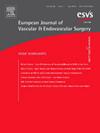机械主动脉瓣患者血管内弓修复术后的疗效:一项多中心研究的结果
IF 5.7
1区 医学
Q1 PERIPHERAL VASCULAR DISEASE
European Journal of Vascular and Endovascular Surgery
Pub Date : 2025-02-01
DOI:10.1016/j.ejvs.2024.09.029
引用次数: 0
摘要
研究目的本研究旨在调查主动脉瓣机械瓣膜需要跨瓣的患者接受主动脉弓血管内修复术后的效果:方法:开展一项国际性、多中心、回顾性观察研究,纳入所有接受主动脉瓣机械跨瓣的血管内主动脉弓修复术的连续患者:从 2020 年 3 月到 2023 年 8 月,共有 12 名患者被纳入研究(中位年龄 55 岁,四分位数范围 45 至 67 岁;58% 为男性)。五名患者(42%)经基因证实患有结缔组织病(CTD),另有三名患者临床高度怀疑患有CTD。大多数患者使用双叶瓣(11/12;92%),一名患者使用单叶瓣。所有患者之前都接受过升主动脉手术修复。技术成功率为100%,手术顺利完成且无瓣膜损伤。术后前30天内有两名患者死亡(17%),但没有瓣膜故障的迹象:一名患者死于大面积中风,原因是过多的钢丝和鞘在弓部操作;另一名患者死于不明原因的心脏骤停,尸检未发现瓣膜损伤。术中没有发现瓣膜插管方面的技术问题。在中位八个月的随访期间,一名患者在术后十五个月因与主动脉无关的原因死亡,在最新的计算机断层扫描血管造影中发现了四个内漏,但都不是I型或III型:结论:在经验丰富、手术量大的主动脉中心,对选定的一组机械主动脉瓣患者进行主动脉弓血管内修复术在技术上似乎是可行的,而且相当安全。这些初步结果凸显了手术的复杂性,应通过更大规模的队列研究加以验证。只要仔细选择患者,医生有足够的经验,机械性主动脉瓣的存在将来可能不再是血管内主动脉弓修复术的主要禁忌症。本文章由计算机程序翻译,如有差异,请以英文原文为准。
Outcomes after Endovascular Arch Repair in Patients with a Mechanical Aortic Valve: Results from a Multicentre Study
Objective
The aim of this study was to investigate outcomes after endovascular aortic arch repair in patients with a mechanical aortic valve where the valve needs to be crossed.
Methods
An international, multicentre, retrospective observational study was undertaken including all consecutive patients who underwent endovascular arch repair with mechanical aortic valve crossing.
Results
From March 2020 to August 2023, 12 patients were included in the study (median age 55 years, interquartile range 45, 67 years; 58% male). Five patients (42%) had a genetically confirmed connective tissue disorder (CTD) and three more had a high clinical suspicion of CTD. Most patients had a bileaflet valve (11/12; 92%) and one patient had a monoleaflet one. All patients had previously undergone surgical ascending aortic repair. Technical success was 100% with successful completion of the procedure with no valve damage. Two deaths (17%) were observed in the first 30 days post-operatively with no signs of valve malfunction: one patient died of major stroke due to excessive wire and sheath manipulation in the arch; and another due to cardiac arrest of unknown cause, with no valve damage being detected in the autopsy. No intra-operative technical difficulties regarding valve cannulation were observed. During a median follow up of eight months, one patient died fifteen months after the procedure owing to non-aortic related causes, and four endoleaks were present on the latest computed tomography angiography, none type I or III.
Conclusion
Endovascular aortic arch repair in a selected group of patients with a mechanical aortic valve, treated in experienced high volume aortic centres, seems technically feasible and reasonably safe. These preliminary results underline the complexity of the procedure and should be validated by larger cohort studies. With careful patient selection and adequate physician experience, the presence of a mechanical aortic valve could potentially no longer pose a major contraindication to endovascular arch repair in the future.
求助全文
通过发布文献求助,成功后即可免费获取论文全文。
去求助
来源期刊
CiteScore
6.80
自引率
15.80%
发文量
471
审稿时长
66 days
期刊介绍:
The European Journal of Vascular and Endovascular Surgery is aimed primarily at vascular surgeons dealing with patients with arterial, venous and lymphatic diseases. Contributions are included on the diagnosis, investigation and management of these vascular disorders. Papers that consider the technical aspects of vascular surgery are encouraged, and the journal includes invited state-of-the-art articles.
Reflecting the increasing importance of endovascular techniques in the management of vascular diseases and the value of closer collaboration between the vascular surgeon and the vascular radiologist, the journal has now extended its scope to encompass the growing number of contributions from this exciting field. Articles describing endovascular method and their critical evaluation are included, as well as reports on the emerging technology associated with this field.

 求助内容:
求助内容: 应助结果提醒方式:
应助结果提醒方式:


